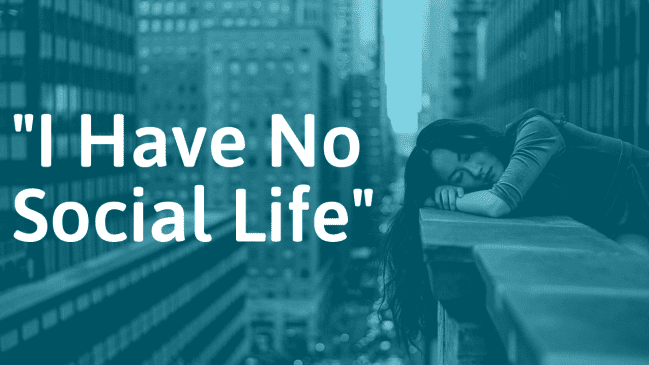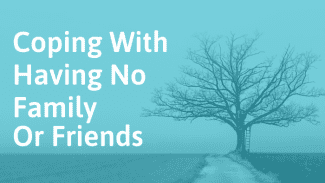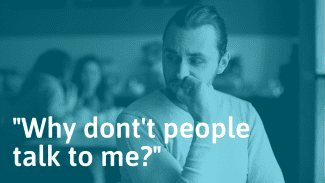“I have no social life. I can’t find anything wrong with me, but still, I spend most of my time alone. It’s easier to be social if you already have friends. But how do you get a social life if you don’t have someone who can invite you to do things?”
Feeling isolated can be bad for your mental and physical health[1]. Luckily, there are several proven ways you can build up a social life. There have been times in my life where I had almost no social interaction, and I’ve been using many of the methods described here to over time build a fulfilling social life for myself.
It takes time and effort, but the upside is enormous.
Part 1: Reasons for not having a social life
Part 2: Building a social circle if you have no friends
Part 3: Turning acquaintances into friends
Part 4: Rebuilding a social circle after losing your old friends
“I never learned social skills”
You might be worried that you missed out by not socializing or dating enough during high school and college. It can feel like there was a specific time during which everyone else learned how to do this and you missed out.
You might be surprised to know that many people feel this way. It can help to approach learning to make friends in the same way that you would other skills, starting small with regular practice.
Rather than avoiding social interaction, you can see it as an opportunity to practice, just like you’d practice any other skill in life. Remind yourself that every hour you spend interacting with people, you’ll become a little bit better at it.
“I’m too shy to make friends”
If you struggle with shyness, you may be giving out social cues that you do not want social interaction, even if this isn’t true. These cues can be in the way you answer questions, your body language, or your tone of voice. Examples include:
- Giving single-word answers to questions.
- Covering your body with your arms during conversations.
- Speaking so softly that others struggle to hear you.
- Turning your body away from the person you are talking to or avoiding their gaze.
The tips below will give you some ideas for ways to communicate that you are open to friendship. Here’s our guide on how to be more approachable.
Depression or anxiety can make social situations difficult
If you suffer from depression or an anxiety disorder, social events can be a perfect example of the ‘impossible task’[2]. Even social situations that you look forward to can feel like too much of an emotional burden. A therapist or a doctor may be able to help you resolve the underlying causes.
In the meantime, smaller events, or those where you don’t need to commit in advance, can feel more manageable. Keep a list of social events that you can attend without pre-arranging. This can allow you to practice your social skills on your good days without creating a burden when things are difficult.
Meetup.com can be a good place to find these types of events.
Here’s Helpguide’s guide to overcoming social anxiety.
Social situations can have unwritten rules
“I feel like if I were to go out and try to do any of these things I would feel like a child”
If you didn’t have a large social group growing up, the nuances of social interactions can be complicated. Social rules are often assumed rather than explained and getting one wrong can knock your confidence.
Try to remember that social rules are often arbitrary and optional. Thinking about implicit rules can be helpful, but can also cause cognitive overload. If you experience this, behave in a way you feel comfortable doing. If you concentrate on kindness and consideration, most social blunders are easily forgiven.
Show that you are friendly by asking sincere questions and using an open body language. If you, say, upset someone by mistake, be candid and explain that you say the wrong thing at times but that you don’t mean anything bad.
It can be hard to make time for a social life
You might have found it much easier to maintain a social life as a child or at college than you do as an adult. This is partly because we used to have fewer responsibilities and more free time in our teens. You may now prioritize work or household tasks over enjoyable experiences.
Responsibilities tend to expand to fill all available time. If you feel guilty for spending time on purely social activities, try giving yourself a social ‘prescription’. This is the minimum amount of time that you need to spend socializing per month to stay happy and healthy.
Try dividing this into small segments and get used to taking time out most days for social interaction. This can help socializing feel more natural.
“I think I’m too clingy”
Feeling the lack of a social group can lead you to try to become too intimate with new people too quickly. This can lead to the friendship feeling pressured or forced and the other person having to enforce their own boundaries. This, in turn, can feel like rejection.
Give people space. If you’ve proposed meeting up with someone the last several times, give them some space for two or three weeks.
“I don’t want to be a burden”
You might find that you have the opposite problem, not wanting to pressure other people into social interaction. If you never take the initiative and invite other people to join you, you can come across as aloof and uncaring.
This can reflect an underlying insecurity about what other people will get out of being with you. This can be difficult to address alone, so you might want to consider working with a therapist to help you see the value you bring to others.
If you usually avoid taking the initiative to keep in touch, practice reaching out even if it feels uncomfortable. It can be as simple as “It was nice talking with you last time we met. Do you want to catch up over a coffee this weekend?”
There’s always a risk of not getting a response. However, building up a social circle will always mean taking risks and experiencing some rejection. You can choose to see rejection as something positive: proof that you’ve tried.
In the previous chapter, we looked at the reasons behind not having a social life. In this chapter, we’ll go through how to make friends even if you have no friends today.
Also, see our main article on how to be more social.
Limit your social media usage
If meeting people in real life is like eating a healthy meal, social media is like snacking. It’ll make you full enough to not crave real food, but you’ll still feel like something’s missing.
That’s why it’s common for people to try to substitute real-life social interaction with social media.
The social lives we see online don’t resemble the lives most of us live. Although you know that the face people present on social media rarely bears a close resemblance to ‘real-life’, it can still feel emotionally isolating and draining to see everyone else appearing to be having fun.
Ask yourself whether time spent on social media is actually helping you to feel more connected, or whether it leaves you feeling worse. If it’s not helping, try limiting the time you spend looking at other people’s posts to 10 minutes per day. Doing so can reduce feelings of loneliness and depression[4].
Create the type of social life that works for you
Try to avoid comparing your social life to what you think other people have, or to what a social life “should” be.
If you’re not sure what you would like your social life to look like, make a list of things that would make you happy, starting each item with “I enjoy” or “I would like”. Be specific. Avoid phrases like “I should go out more” in favor of “I would like to have a friend to go kayaking with” or “I enjoy discussing books with friends”.
Ask yourself in what way you can realize the things you’ve written down.
Find the social aspect of your existing interests
Although your primary pastimes may not be things that you can share doing, most activities have groups that share an interest in them. Artists, for example, may paint alone but can share their work and discuss art socially.
Remember that most people want to have a social group that is similar to them in terms of values, beliefs, and preferences[5]. If you find people who share your interests, they’re likely to be similar to you in other ways, too.
Help others fulfill their social needs, and they’ll appreciate being around you
Socially successful people tend to be less concerned with getting people to like them, and more concerned making sure that people like being around them.
Having a social life is something that you share with others. This means that they are looking for the same things as you are. In practical terms, most of us are looking for similar things:
- To know that others are paying attention to us and that they care.
- To be heard and understood.
- To be respected.
- To feel that people are there for us if we need support.
- To share enjoyable events.
If you try to give those things to others, and to show it, you are likely to get a positive response.
This quiz from UC Berkeley can help you practice empathy. Having well-developed empathy can help us understand others’ needs better.
Ask yourself what type of friends you are looking for
When you are worried about not having a social life, you may assign high importance to every social encounter and try to become close with anyone who shows signs of accepting you.
To create a healthy and supportive social group, it’s important that you consider what your needs are and think about whether the people you are spending time with fulfill those needs.
Try making a list or writing a description of what a close friendship group would look like to you. It’s rare that anyone will fit this description perfectly, but knowing what you value can make it easier to walk away from groups that are not a good fit for you, and to know what you’re searching for.
You’ll find more advice in our article on how to get a social life.
Creating a good social life requires making the transition from having people you know to having close friends. Otherwise, it is possible to appear socially active without feeling that you have a ‘proper’ social life[6].
Moving from acquaintances to friends requires that you devote time to the relationship, that you both give and earn trust and that you build a set of expectations. There are many ways to build trust, but offering help can show that you consider someone a friend and demonstrate that you can be relied upon.
Spend enough time together
It takes longer to make friends than most people think. Developing a close friendship with someone can take 150-200 hours of interaction.[7]
This is why most people make friends in places where they meet people on a regular basis for a long time. Examples of these types of places are classes, work, school, clubs, or volunteering. Go to recurring events and take all opportunities to socialize with people.
Luckily, you can speed up the process of making friends considerably by sharing and asking personal questions.
Dare to trust people, even if you’ve been betrayed in the past
For two people to become friends, they have to trust each other. If you have trust issues because of past trauma, this can be difficult. If you feel like someone’s actions are proof that they dislike you or betray you, ask yourself if there could be another explanation for their behavior before you cut them off.
For example, if someone’s late or cancels on you, ask yourself if there are other possibilities than betrayal. Perhaps you can recall situations where you’ve done the same. Maybe they really did get stuck in traffic or they did in fact forget that you were meeting up.
Being alert to other possibilities gives you the chance to trust the other person.
Pay attention
We noted above how being heard and understood is one of the key things that people are looking for from a friend. Demonstrate that you are paying attention to people you would like to be friends with.
If you struggle to remember important features, keep brief notes to remind you. These could include facts, such as their birthday, or things that are important to them, such as family members or hobbies. If they have a major event coming up, set yourself a reminder to ask them about it. But most importantly, give people your full attention when they talk to you. Rather than thinking about what you should say next, inquire and make a sincere effort to get to know them.
Share about yourself
While it’s important to get to know people, you also have to let others get to know you. It’s not true that people only want to talk about themselves. They also want to get to know who they are talking too. Inbetween asking sincere questions and trying to get to know someone, share bits and pieces about yourself, your life, and how you see the world.
If you feel uncomfortable opening up about yourself, start with smaller things, such as sharing what music you like or what you like doing in your spare time.
Maybe you had friends in the past but are struggling to create a new social circle. The emotional connections you have, positive or negative, towards your old group can create difficulties for you in forming new friendships.
Creating a new social group after moving to a new area
If you’ve moved to a new city, you might lose the ease of connection with your old friends. You no longer have the spontaneous, face-to-face interactions and you may feel left out of events that you used to enjoy. Attachments to the old friend group can make it feel difficult to find new friends and your old friendships can feel much less rewarding.
If you substitute seeking out new friendships with talking to your old friends, you can try limiting your time keeping in touch with them. This can free up time and emotional space in your life for new friends whilst maintaining the close bonds you still value.
Here’s our advice on how to make friends in a new city.
Creating a new social group after a relationship breakdown
Some people may be able to stay close friends with an ex-partner. For others, it can be more difficult. The breakdown of toxic or abusive relationships, in particular, can require that you create a new social group of people who are supportive of you and your decisions.
When the loss of a social group happens at the same time as the loss of a relationship, you may be feeling especially vulnerable. Spend some time thinking about places and situations in which you feel safe and confident. It’s ok to take time to develop new friends and to learn to trust them. There’s nothing wrong with spending some time staying within your comfort zone while you heal. Once you’re ready, try some of my tips above for how to start building a new social group.
Making new friends after a bereavement
Building a new social group following a bereavement can bring up a range of difficult emotions, including guilt, fear, and loss[3]. Building a new social group of people who never knew your loved one can be particularly painful.
Many bereavement charities offer meetups and social events as a way for you to rebuild your social circle. Knowing that other members of this group have similar experiences to yours can make it easier to open up and to build friendships.














i spend all my time by myself, i don’t live alone but my sister and i have very different interests ,i have a couple of friends who i see from time to time but we stay at the house when we meet, im waiting on mental health care which takes a long time in the UK,i also have a disability which makes getting around difficult, i’m still recovering from being treated badly at my old doctors ,thankfully the new one is good,i came off social media as i was mostly ignored ,i just don’t have anything in common with people and thats always been the case,i don’t do romantic relationships ,i have my reasons ,so its a lonely old life but im used to it ,but still have depression,meeting new people is difficult,i can only be myself around people i know well,i mostly stay at home except when i have appointments ,don’t really know how to change ,im also terrified to trust again after what happened at the doctors